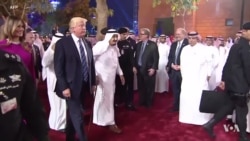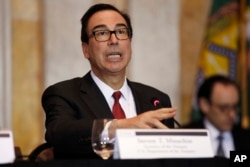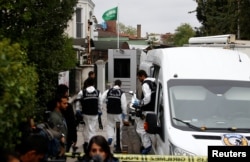Asked Thursday by reporters whether Saudi journalist Jamal Khashoggi was dead, U.S. President Donald Trump responded it "certainly looks" as if he is and that is "very sad."
There will be "very severe" consequences if the Saudis killed him, promised Trump, speaking on the tarmac at Joint Base Andrews before boarding Air Force One.
Trump's administration is willing to give Saudi Arabia a bit more time to finish its investigation into Turkish allegations that agents from the kingdom killed Khashoggi inside Riyadh's consulate in Istanbul.
WATCH: Pressure Mounts on Trump to Confront Saudis on Khashoggi
More time
Secretary of State Mike Pompeo, after meeting with Saudi and Turkish leaders this week, briefed Trump at the White House earlier Thursday, telling him to give Saudi Arabia a few more days to complete its investigation of the disappearance of the writer, who lived in the U.S. state of Virginia.
After the U.S. assesses the Saudi report, Pompeo said, "the United States will determine what the appropriate response might be."
Pompeo said there were "a lot of stories out there about what has happened" to Khashoggi, but he declined to speculate on the outcome of investigations in Saudi Arabia and Turkey. The top U.S. diplomat said he believed "a complete picture will emerge" from the probes.
Pompeo said he told Saudi King Salman and the country's de facto leader, Crown Prince Mohammed bin Salman, that the U.S. was taking Khashoggi's fate "very seriously," but also noted that the U.S. and Saudi Arabia have had a "strategic alliance" for decades.
Meanwhile, U.S. Treasury Secretary Steven Mnuchin said he was dropping out of next week's Saudi investment conference in Riyadh. The conference is designed to showcase the crown prince's effort to diversify the Saudi economy beyond its role as the world's leading oil exporter. Numerous Western corporate chieftains had already pulled out of the three-day gathering as Saudi Arabia struggles to answer questions about Khashoggi's fate.
Pompeo's discussion with Trump came as Turkish investigators carried out a new search of the consulate, their second this week, and completed a nine-hour search of the nearby residence of the Saudi consul to Istanbul, Mohammad al-Otaibi, who abruptly returned to Riyadh on Tuesday.
Results to be released
Saudi Arabia has denied knowledge of Khashoggi's disappearance. Pompeo said as he left Riyadh that the Saudi leaders did not want to discuss any facts of the case while they carried out their investigation. They have promised to release results to the public.
After meeting with the Saudi leaders, Pompeo flew to the Turkish capital, Ankara, to meet with President Recep Tayyip Erdogan and Foreign Minister Mevlut Cavusoglu.
Pro-government Turkish media have published investigators' claims that the Saudi agents cut off Khashoggi's fingers, decapitated him and then dismembered his body shortly after he arrived at the consulate Oct. 2 to pick up documents so he could marry his fiancee, Turkish national Hatice Cengiz. She waited in vain outside for Khashoggi's return. Khashoggi has not been seen since.
The pro-government newspaper Sabah identified Saudi security official Maher Abdulaziz Mutreb as the leader of what it said was a 15-member "assassination team" that flew into Istanbul to carry out the execution of Khashoggi.
Khashoggi had been living in self-imposed exile in the United States while writing columns for The Washington Post that criticized the crown prince and the Saudi involvement in the war in Yemen.
On surveillance tapes
The Turkish newspaper said Mutreb, who has been photographed near the crown prince on his foreign travels this year, was spotted on surveillance tapes entering the consulate more than three hours before Khashoggi arrived, then later the same day outside the consul's residence and then again in the evening at the airport as he left Turkey.
Meanwhile, the Post published what it said it thought would be Khashoggi's last column, one in which he decried the lack of freedom of the press in the Arab world.
"The Arab world is facing its own version of an Iron Curtain, imposed not by external actors but through domestic forces vying for power," he wrote.
"The Arab world needs a modern version of the old transnational media so citizens can be informed about global events. More important, we need to provide a platform for Arab voices," Khashoggi said.
Trump said Wednesday that he wanted audio and video intelligence from Turkey, "if it exists," while saying it "probably does."
Trump's demand came as he expressed support for Saudi Arabia, a longtime U.S. ally, and said he expected its investigation into Khashoggi's disappearance would be completed by the end of the week.
Ken Bredemeier, Chris Hannas and State Department correspondent Nike Ching contributed to this report.










